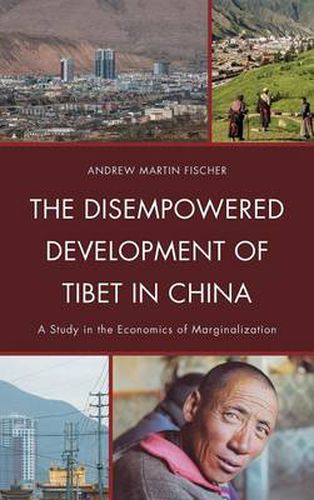Readings Newsletter
Become a Readings Member to make your shopping experience even easier.
Sign in or sign up for free!
You’re not far away from qualifying for FREE standard shipping within Australia
You’ve qualified for FREE standard shipping within Australia
The cart is loading…






This title is printed to order. This book may have been self-published. If so, we cannot guarantee the quality of the content. In the main most books will have gone through the editing process however some may not. We therefore suggest that you be aware of this before ordering this book. If in doubt check either the author or publisher’s details as we are unable to accept any returns unless they are faulty. Please contact us if you have any questions.
Series: Studies in Modern Tibetan Culture, Lexington Books Weatherhead East Asian Institute, Columbia University
Since the central government of China started major campaigns for western development in the mid-1990s, the economies of the Tibetan areas in Western China have grown rapidly and living standards have improved. However, grievances and protests have also intensified, as dramatically evidenced by the protests that spread across most Tibetan areas in spring 2008 and by the more recent wave of self-immolation protests that started in 2011. This book offers a detailed and careful exploration of this synergy between development and conflict in Tibet from the mid-1990s onwards, when rapid economic growth has occurred in tandem with a particularly assimilationist approach of integrating Tibet into China.
Fischer argues that the intensified economic integration of Tibet into regional and national development strategies on these assimilationist terms, within a context of continued political disempowerment, and through the massive channeling of subsidies through Han Chinese dominated entities based outside the Tibetan areas, has accentuated various dynamics of subordination and marginalization faced by Tibetans of all social strata. Whether or not these dynamics are intended to be discriminatory, they effectively accentuate the discriminatory, assimilationist and disempowering characteristics of development, even while producing considerable improvements in the material consumption of local Tibetans. In particular, strong cultural, linguistic and political biases intensify ethnically-exclusionary dynamics among middle and upper strata of the Tibetan labor force, which is problematic considering the rapid shift of Tibetans out of agriculture and towards the highly subsidy-dependent sectors of the economy, especially in urban areas.
The combination of these disempowering dynamics with the sheer speed of dislocating and disembedding social change provides important insights into recent tensions given that it has accentuated insecurity while restricting the ability of Tibetan communities to adapt in autonomous and self-determined ways.
The study represents one of the only macro-level and systemic analyses of its kind in the scholarship on Tibet, based on accessible economic analysis and extensive interdisciplinary fieldwork. It also carries much interest for those interested in China and in the interactions between development, inequality, exclusion and conflict more generally.
$9.00 standard shipping within Australia
FREE standard shipping within Australia for orders over $100.00
Express & International shipping calculated at checkout
This title is printed to order. This book may have been self-published. If so, we cannot guarantee the quality of the content. In the main most books will have gone through the editing process however some may not. We therefore suggest that you be aware of this before ordering this book. If in doubt check either the author or publisher’s details as we are unable to accept any returns unless they are faulty. Please contact us if you have any questions.
Series: Studies in Modern Tibetan Culture, Lexington Books Weatherhead East Asian Institute, Columbia University
Since the central government of China started major campaigns for western development in the mid-1990s, the economies of the Tibetan areas in Western China have grown rapidly and living standards have improved. However, grievances and protests have also intensified, as dramatically evidenced by the protests that spread across most Tibetan areas in spring 2008 and by the more recent wave of self-immolation protests that started in 2011. This book offers a detailed and careful exploration of this synergy between development and conflict in Tibet from the mid-1990s onwards, when rapid economic growth has occurred in tandem with a particularly assimilationist approach of integrating Tibet into China.
Fischer argues that the intensified economic integration of Tibet into regional and national development strategies on these assimilationist terms, within a context of continued political disempowerment, and through the massive channeling of subsidies through Han Chinese dominated entities based outside the Tibetan areas, has accentuated various dynamics of subordination and marginalization faced by Tibetans of all social strata. Whether or not these dynamics are intended to be discriminatory, they effectively accentuate the discriminatory, assimilationist and disempowering characteristics of development, even while producing considerable improvements in the material consumption of local Tibetans. In particular, strong cultural, linguistic and political biases intensify ethnically-exclusionary dynamics among middle and upper strata of the Tibetan labor force, which is problematic considering the rapid shift of Tibetans out of agriculture and towards the highly subsidy-dependent sectors of the economy, especially in urban areas.
The combination of these disempowering dynamics with the sheer speed of dislocating and disembedding social change provides important insights into recent tensions given that it has accentuated insecurity while restricting the ability of Tibetan communities to adapt in autonomous and self-determined ways.
The study represents one of the only macro-level and systemic analyses of its kind in the scholarship on Tibet, based on accessible economic analysis and extensive interdisciplinary fieldwork. It also carries much interest for those interested in China and in the interactions between development, inequality, exclusion and conflict more generally.